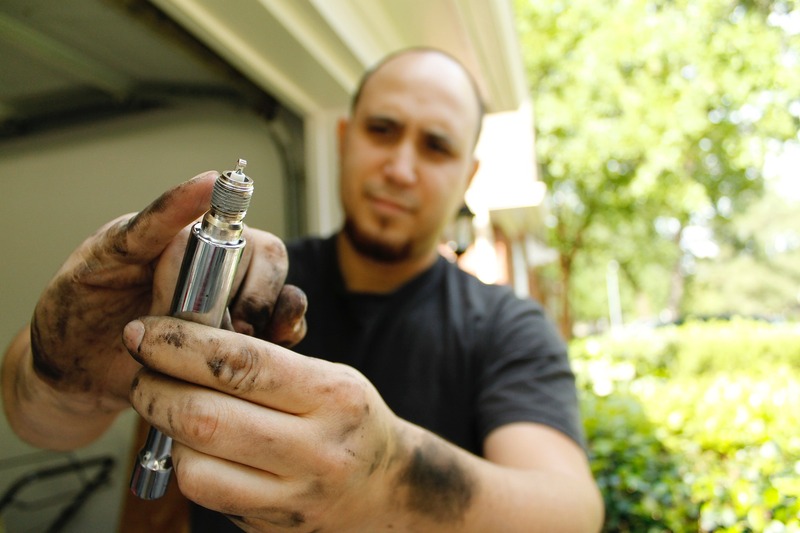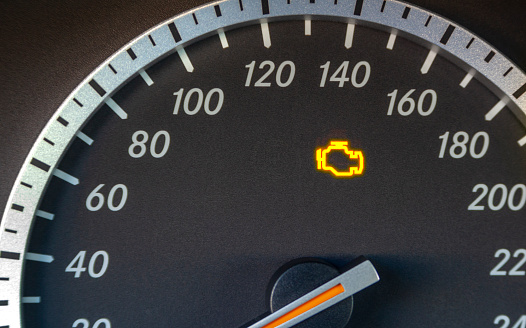The malfunction indicator lamp (MIL), also referred to as the check engine light or MIL, is an engine computer warning indicating something is amiss. If your car is flashing check the engine light then stops, then you need to look into the issue right away.
We have both good news and terrible news for you if you find yourself in this predicament. The good news is that your car may not always be in grave danger when the check engine light comes on. The bad news is that your car may be seriously malfunctioning if your check engine light comes on. Fear not; we’ll explain what all needs to be done and why when check engine light flashing then stops.
What Causes a Flashing Check Engine Light?
An issue with the ignition or fuel supply system is what causes the check engine light to flash (or both). Over a period of weeks, if flashing check engine light then stops, it may be an indication of a faulty fuel injector, mass air flow sensor, ignition coil, or camshaft position sensor. Let’s study each cause why is the chevy check engine light flashing then stops:
1. Ignition System Issue

A malfunctioning ignition system won’t be able to properly ignite the fuel, which will result in a misfire. Blinking the check engine light then stops could be the result of defective ignition coils. An issue with the ignition system can result in engine misfires. These issues can be brought on by:
- Faulty or bad spark plugs
- One or more spark plugs with oil
- Faulty or inadequate spark plug wires
- Faulty or inadequate ignition coil(s)
- An unreliable or flawed crank position sensor(ckp)
- An unreliable or flawed cam position sensor(cmp)
Read Also: Common Problems After Changing Fuel Pump
2. Fuel Delivery System Issue
On the other hand, a lean mixture condition brought on by insufficient fuel delivery will also result in engine misfires. Fuel-related engine fires may result from:
- Bad, inadequate, or obstructed fuel pump
- In-line fuel filter malfunctioning or clogged
- Ineffective or blocked fuel tank filter
- Unreliable or inadequate fuel pressure regulator
- Faulty or inadequate fuel injector (s)
- Poor, ineffective, or obstructed mass air flow sensor
- Leaky intake manifold seriously
- OBD diagnostic reader
The best method to diagnose and identify the problematic component, towards flashing check engine light then stops, is often to use an expert automobile scanner.
Common Symptoms of Check Engine Misfire
You might also notice one of the following symptoms in addition to flashing check engine light then stops:
- Erratic idle
- Having trouble starting your car
- Inadequate fuel efficiency
- Absence of electricity
- Unique misfire sound coming from your engine
- Your tailpipe is smelling like gas.
- Your tailpipe smells like rotten eggs.
- Your tailpipe is emitting dark smoke.
What’s the Cost to Repair the Car Components When It’s Flashing Check the Engine Light Then Stops?

Depending on the root of the issue, the cost of fixing a flashing check engine light can vary significantly, and it is hard to estimate the cost for every sort of issue.
Changes to engine filters or spark plugs are frequently inexpensive fixes that can remedy the problem. If you employ a mechanic to complete the task, the cost may be higher—between $50 and $100. It may become more expensive if the issue is brought on by a malfunctioning engine sensor or ignition coil.
Repairs for engine sensors such as mass air flow sensors and camshaft position sensors can run anything from $40 to several hundred dollars. Ignition coils are typically more expensive, and repairs might cost hundreds or even more than $1,000 for newer luxury vehicles.
Depending on the severity of the issue (if a component needs to be replaced) and the amount of labor required, problems with turbochargers, EGR valves, fuel injectors, and fuel pumps can cost anywhere from $150 to $800 to correct.
Is it Wrong to Drive When Car’s Check Engine Light Flashing and Then Stops?
Chevy check engine light flashing then stops means your automobile is misfiring. In this case, you shouldn’t drive it because doing so could result in serious harm. A misfiring engine may result in issues with overheating and even a burst head gasket. The following are a few potential effects of operating a vehicle while the check engine light is flashing:
- Harm to the catalytic converter.
- Heating up the engine.
- Failure of the cylinder head gasket.
- Cylinder head failure
- Damaged exhaust valve (s).
What to do When the Check Engine Light Flashing Then Stops?

Don’t drive the automobile if the check engine light turns on during startup. If chevy check engine light flashing then stops while you’re driving, stop as soon as it’s safe to do so. Once your car is securely parked, you should complete the following fast engine inspection.
- If you can, make a note of the instrument panel’s engine coolant temperature reading.
- If you think the temperature is higher than normal, turn the engine off right away.
- Open the hood if the temperature is okay and listen for unusual noises coming from the engine.
- Shut off the engine if you hear any strange noises. In any case, shut the engine off.
- Assuming the temperature and noises are normal, circle back to the back of your car to look for any exhaust-related issues.
- A bad sign is any gas smell, rotten egg odor, or blue, white, or black smoke.
- Call your mechanic or a tow truck if you are unable to resolve the issue yourself.
Why is My Chevy Check Engine Light Flashing Then Stopping and the Car is Shaking?
If your car shakes when accelerating or idling and your check engine light is glowing, an engine misfire or a faulty idle air control valve may be to blame. A wide variety of difficulties, including defective spark plugs, malfunctioning coil packs (or ignition coils), and engine sensor problems, to mention a few, can lead to engine misfires, indicated by blinking the check engine light then stops.
In order to prevent damage, you should turn off the engine as soon as your automobile begins to shake. Before performing a physical inspection of the engine, run a diagnostic check to discover if any fault codes are present.
Check Engine Light Flashing Then Solid?
Blinking check engine light then stops – may occasionally blink briefly before staying on. This typically indicates a failed component causing an erratic issue that momentarily resolves itself. For instance, if you have one or more defective spark plugs or ignition coils, this may cause the check engine light to come on and the engine to briefly misfire randomly.
The check engine light will remain illuminated even if the engine is running properly until the problem code is removed from the ECU’s memory. In order to prevent engine damage, you should look into the matter further if the check engine light returns after the error code has been removed.
Summarising
Blinking check engine light then stops – this typically comes on to alert you to an issue with the engine in your car, so you shouldn’t disregard it.
FAQs
1. What to do when check engine light comes on while driving?
You should stop driving at this point and get your car checked out by a mechanic as soon as you can. When deciding whether to drive yourself or contact a tow truck to a local repair shop, use your best judgement.
2. What is the most common reason for car’s check engine light flashing and then stops?
A malfunctioning ignition cylinder is typically the cause of a blinking check engine light then stops. The light flashes rather than staying on because misfiring needs to be investigated and repaired straight away. The catalytic converter may get damaged by misfiring, necessitating more costly repairs.
3. Can I drive home with a blinking check engine light?
As a general rule, you shouldn’t continue to drive if your check engine light is blinking. It is a crisis. It frequently signifies an engine misfire. The (expensive) catalytic converter will likely sustain the most irreparable damage if you continue to drive.
4. How long can you drive with a blinking engine light?
Depending on the problem that caused the Check Engine light to come on, you could be able to keep driving for 50 and 100 miles, which should ideally bring you to a mechanic to resolve the issue.
5. Can a check engine light turn itself off?
If the problem that caused the check engine light to come on is fixed, the light will go out automatically. Therefore, if your converter is marginal and you frequently drive in stop-and-go traffic, which places a heavy demand on the converter, the check engine light may have come on as a result.
